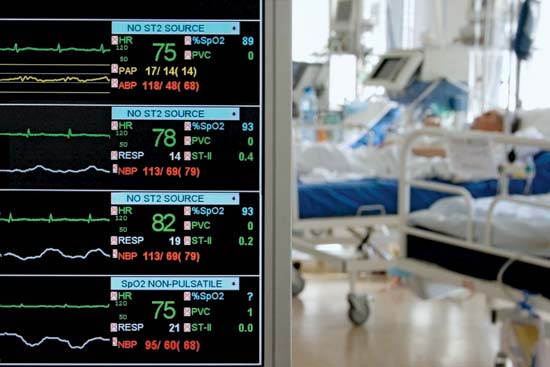[The third post in a series on becoming a Christian physician. Earlier posts are Do You Want to Be a Doctor? and Helping People Is Not Enough].

After working 24 hours on call in the pediatric ICU, I was exhausted. I wanted to sleep, but friends had recently been reminding me of the health benefits of breakfast, so I dragged myself to a local diner for breakfast and sat at the counter next to a father and his little daughter. “We graduated from the booth to the counter,” he was explaining to the waitress, trying to hide his pride. The little girl looked shyly up, swiveling playfully on the rotating seat as she stretched up to rest her elbows on the countertop. I tried not to glance at them too much, but I was overwhelmed and fascinated by many simple things: the widening of her eyes at the stack of pancakes, the delighted silence as she chewed her way through the syrupy mess, the polite sips of tart orange juice from a well-worn cup.
The hospital tends to “stick” or creep into the outside world. That weekend I had been having nightmares, imagining what it would be like to suddenly find that my eight year old daughter was brain-dead, or my ten year old son was killed in a car accident, or my brother’s cold turned out to be leukemia.* Random and otherwise innocent sounds would make me think of beeping monitors and noisy breathing machines. It seemed difficult to completely extract myself from the hospital. Even when I went to the DMV, the inspector saw me in scrubs and asked, in an attempt to connect, “Do you work in the hospital? Have you seen dead people? . . . Are some of them children? That must be hard; I can’t imagine.”

I remembered a night spent in the ICU as a medical student, rushing to leave the hospital after a long shift:
Of my six teen hours on shift, there were two remain ing. Then one. Five min utes. Finally my res i dent dis missed me. “Go get some rest,” he said kindly, scan ning the com puter screen and mechan i cally punch ing in orders. “All that’s left is paper work. Noth ing more for you.” As per med ical stu dent eti quette, I thanked him, wished him a good night, and strode out of the ICU. I walked down a quiet hall way, pan eled on both sides by glass. The view on the left faced out into the cold, dark, north east ern night. The right faced the sur gi cal ICU wait ing room, which remained lit with muted, tubu lar flu o res cent bulbs. I glanced in and was sur prised to see some one still wait ing inside.
She was sit ting alone. Her eyes were puffy and red, but dry. They looked as if they had been that way for a long time. A thin hos pi tal blan ket was draped care lessly around her shoul ders, which were hunched for ward with a pal pa ble heav i ness. Her motion less pres ence made the room seem more sta tic than if it had been empty. Time him self had decided to stop in and say hello, that there was noth ing par tic u larly impor tant for him to do, and that he could afford to wait around for awhile and sink into the vinyl fur ni ture, lis ten ing to the ven ti la tion hum while he got things ready for eter nity to end next Thurs day or per haps the week after that.
My feet con tin ued to move. I got in my car and felt immensely grate ful that I could sim ply drive away. I could leave this place and the bod ies in their beds and the score on the white board and the time less ter ror of the wait ing room. I could sleep with out night mares and wake up with out fear ing that moment when I sud denly remem ber that every thing is dif fer ent now that she’s gone, ohmy god she’s really gone.
Medicine is attractive as a career option because it showcases the extremes of human circumstances and the moments in which we feel most vulnerable, enraged, thrilled, or in despair. There are plenty of exposures to life-altering and frequently traumatic events, and we imagine that such experiences naturally impart a certain authenticity and virtue of experience to those who participate. However, what has transformed me in surprising ways is an unexpected appreciation for the small and ordinary events of life, like that of a little girl enjoying breakfast with her father.
What gain has the worker from his toil? I have seen the business that God has given to the children of man to be busy with. He has made everything beautiful in its time. Also, he has put eternity into man’s heart, yet so that he cannot find out what God has done from the beginning to the end. I perceived that there is nothing better for them than to be joyful and to do good as long as they live; also that everyone should eat and drink and take pleasure in all his toil—this is God’s gift to man. – Ecclesiastes 3
* Not any specific cases, though sadly each is common enough.
David graduated from Princeton University with a degree in Electrical Engineering and received his medical degree from Rutgers – Robert Wood Johnson Medical School with a Masters in Public Health concentrated in health systems and policy. He completed a dual residency in Internal Medicine and Pediatrics at Christiana Care Health System in Delaware. He continues to work in Delaware as a dual Med-Peds hospitalist. Faith-wise, he is decidÂedly Christian, and regarding everything else he will gladly talk your ear off about health policy, the inner city, gadgets, and why Disney’s Frozen is actually a terrible movie.

Leave a Reply